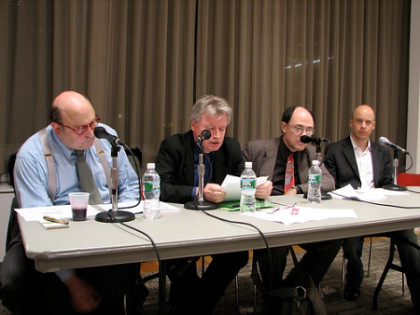
It's been an ongoing debate for, well, um, forever: is 'literary' fiction by default more important than genre fiction, like sci-fi, thrillers/mysteries/crime novels or fantasy? Some, like TIME Magazine columnist Lev Grossman say nay, and point to the recent forays of some big-name authors into more stylized genre fiction (Michael Chabon's recent work comes to mind) as a sign that fiction is fiction is fiction, and 'literary' fiction shouldn't hover above the other genres just because.
Last week, The New School in NYC held a panel discussion to talak it out. The panel, sponsored by the National Book Critic's Circle titled "Merging Genres." The panelists included: Peter Straub, prolific multiple Bram Stoker award winning author and editor of Poe’s Children: The New Horror, just out from Doubleday, and of the Library of America’s H.P. Lovecraft: Tales, was the moderator. The panelists were Lev Grossman, book editor at Time magazine; Geoffrey O’Brien, poet, editor in chief of Library of America, and frequent contributor to the New York Review of Books; Robert Polito, editor of the Library of America editions, Crime Novels: American Noir of the 1930s and 1940s and Crime Novels: American Noir of the 1950s, and director of the Graduate Writing Program at the New School.
Sci-fi and fantasy publisher Tor has a nice summary of the panel, excerpted below:
Theresa DeLucci—only a month back to Tor after Clarion West in Seattle—and I went to listen. Straub, who is a passionate supporter of genre merging, and has done some himself in his works, was an enthusiastic and articulate moderator, and happy in the end to be a genre writer. Each of them read provocative and often enlightening opening statements on genres and literature, from widely differing approaches. The panelists, while agreeing that real literary writers were working with genre materials today, and that some exceptional genre writers were even real literary writers, separated two to one—Polito and O’Brien versus Grossman—on the proposition that this was anything new and different, and that any substantial number of genre texts or genre writers were deserving of serious attention. Grossman attempted to present the Modernist separation between high art and the rest, especially genre, as an important barrier to the acceptance of genre, now in the process of being dismantled, while the others argued passionately that James Joyce was perhaps the archetypal mixer of genres, and that it was incorrect to say that Modernism did not in some way encompass genre and merge genres.
Sci-Fi/entertainment blog io9 share their thoughts on the panel as well:
Does the literary establishment still look down on science fiction through its glossy monocle? Apparently so, judging from a panel that took place at New York City's New School over the weekend. Time Magazine's Lev Grossman argued for tearing down the artificial distinction between "high art" and genre writing, and claimed that the recent trend of literary authors using speculative ideas in their work meant it was time to start taking speculative fiction more seriously. But New York Review Of Books contributor Geoffrey O'Brien and the New School's Robert Polito argued that literary authors have always mixed up genres, going back to James Joyce, and they at least implied that genre fiction is only worthwhile as a source of material for literary authors to mine. Oh well.What's your take? I think there's always gonna be some kind of hierarchy in fiction, as in movies and any kind of creative field -- it's just human nature. Should we be more respectful of more "genre" work? Sure. If it's good, it's good, no matter in what context the work was created. I can point to dozens of crime novels or sci-fi books that read better and are more engaging and overall more fulfilling than a more "literary" or "artistic" work. It's all about what you get out of it. A worthy debate that I don't foresee being resolved soon.






No comments:
Post a Comment